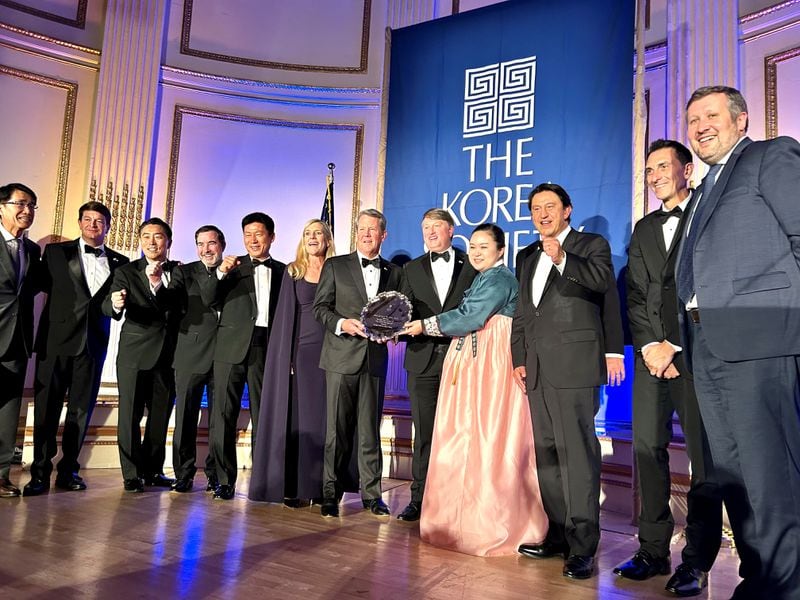If you were to take a tour of Georgia’s largest factories, you’d notice that many share a common symbol flying overhead: a South Korean flag.
Known as the Taegeukgi, the flag has become commonplace across the Peach State as Korean businesses erect gigantic manufacturing facilities and hire thousands of workers. Hyundai Motor Group, Hanwha Qcells and SK Group have become household names in some corners of the state, employing the equivalent of small towns.
But that wasn’t always the case. It took decades of investment and recruitment before Korea emerged as one of Georgia’s most valuable international partners — one that remains top of mind for state leaders.
Gov. Brian Kemp is currently in Korea on his second international tour of the country — and as a result, one-third of his foreign trips since being elected governor in 2019 have been to the Asian republic. The Republican has seen the economic legacy of his two-term tenure as governor defined, in part, by Korean corporate investment, with the country emerging as Georgia’s top foreign investor for the past three years.
Kemp said he’s leading a delegation of state leaders on a weeklong mission to “reinforce those great friendships that are bringing historic investments and jobs.”
Pat Wilson, commissioner of the Georgia Department of Economic Development, said the partnership started when the state opened an office in Seoul in 1985, a time when the Korean economy was undergoing rapid change. Like Georgia, Korea was shifting from an agriculture-based economy to one focused on high-tech and emerging industries, and Wilson said that initial investment has paid dividends in the decades since.
“As our relationship has matured, the Korean economy has matured,” Wilson said. “We are now the beneficiary of multiple decades of commitment to growing our relationships and supporting the companies that we have recruited. It is a long-term strategy.”
That partnership rose to new heights during the past five years, with several Korean companies announcing multibillion dollar projects. Hyundai’s $7.6 billion electric vehicle “Metaplant” near Savannah is the state’s largest-ever economic development project, which commanded a record-setting $1.8 billion package of state and local incentives.
The automotive juggernaut in late 2022 also announced a joint $5 billion EV battery plant in Bartow County with SK On, just a few weeks before Qcells announced a $2.5 billion expansion to its Georgia solar panel production footprint.
José Muñoz, Hyundai North America’s chief executive, said his company’s fast-growing relationship with Georgia is a testament to the state’s infrastructure, logistics network, workforce and “pro-business climate.”
He said the relationship has coincided with an increased prevalence of Korean Americans living in Georgia, a number that now tops 150,000 according to Sangpyo Suh, the Consul General of South Korea in Atlanta.
“Georgia has some of the best Korean BBQ outside of Seoul!” Muñoz added.
Choosing to be first
The progenitor for Korean investment in Georgia was in Covington nearly 30 years ago.
SKC, a subsidiary of conglomerate SK Group, opened a polyester film factory in 1996, becoming the first Korean-owned company to operate a manufacturing facility in Georgia.
Credit: Ben Hendren
Credit: Ben Hendren
Gary Park, the chief operating officer for Absolics, another SK subsidiary, was part of the initial SKC team that scouted Covington and other U.S. locations. By being the first, he said his company had to break culture and language barriers.
“Now, a lot of Korean Americans are bilingual and are second generation or third generation,” Park said. “But at the time, it was not easy… there was no shortcut.”
Covington Mayor Fleeta Baggett’s father was an elected official in the 1990s who helped recruit SKC to the city. Located roughly 35 miles east of downtown Atlanta, Covington’s manufacturing jobs used to center around agriculture, such as cotton mills, Baggett said. But SKC’s line of polyester films, which are used in products varying from videotapes to solar panels, ushered in a new type of high-tech manufacturing.
“People like my daddy, whose mother worked at the mill, can’t even wrap their head around the difference,” Baggett said.
SK’s investment in Georgia has been persistent, with seven of the company’s subsidiaries housing some form of operation in the Peach State, according to Park. Other Korean companies eventually entered the mix, setting new milestones.
Kia’s West Point factory opened in 2009 and became Georgia’s sole automaker after the closures of factories from Ford and General Motors. In 2021, SK Battery America’s battery plant in Commerce became Georgia’s first foray into lithium-ion battery production. Hyundai’s Metaplant that’s currently under construction in Coastal Georgia is set to employ 8,500 workers.
“Once you have one anchor company, it’s very easy for other companies to select that area as their new nest,” Park said.
‘Like science fiction’
State leaders who have visited Korea have described it as peering into the future.
Korean companies have emerged to prominence by developing cutting-edge technologies, including high-end computer chips and hydrogen-powered transport vehicles. Wilson, the state department of economic development’s commissioner, said some of the tech can seem “like science fiction,” which is why it’s valuable for Georgia leaders to see it firsthand.
Credit: J. Scott Trubey/AJC
Credit: J. Scott Trubey/AJC
Muñoz and other Hyundai leaders have announced a wide-ranging vision for using hydrogen logistics in Georgia — including producing hydrogen from organic waste such as food, sludge and manure, and using hydrogen to fuel everything from buses to power generators to aircraft. Wilson said a major aspect of the current Korea trip is to educate policymakers on how to assist Hyundai with accomplishing its goal.
“This is not a political move that’s being mandated out of Washington,” Wilson said, taking a jab at federal initiatives backed by Democrats that aim to promote clean energy adoption. “This is companies making the decision to move in a direction of clean mobility, because it’s what they want to do.”
Kwanza Hall, the vice chairman of the Development Authority of Fulton County, visited Korea in April along with county leaders on a separate business recruitment trip, but he described a similar experience. He said the Fulton delegation visited the “Silicon Valley of South Korea.”
“It was fascinating to see the technologies and how advanced they are in everything they’re doing,” Hall said.
Credit: Develop Fulton
Credit: Develop Fulton
He said his authority, which is also known as Develop Fulton, aims to attract Korean investment specifically to the county’s Southside. The mayors and economic development staff of two Korean cities — SeongNam and Incheon — were scheduled to visit Fulton this weekend to explore business investment opportunities, Hall said.
Wilson said Georgia leaders have to remain vigilant to maintain the momentum the state has built with Korean companies.
“The sale doesn’t end with the announcement and the ribbon-cutting,” he said. “We really want to look down the road and (treat this) as a 50-year partnership.”











